|
|
|
Sort Order |
|
|
|
Items / Page
|
|
|
|
|
|
|
| Srl | Item |
| 1 |
ID:
072214
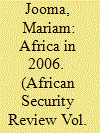

|
|
|
| 2 |
ID:
006394
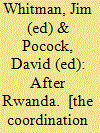

|
|
|
|
|
| Publication |
London, Macmillan, 1996.
|
| Description |
xx, 253p.
|
| Standard Number |
033364588X
|
|
|
|
|
|
|
|
|
|
|
|
Copies: C:1/I:0,R:0,Q:0
Circulation
| Accession# | Call# | Current Location | Status | Policy | Location |
| 038052 | 361.26/WHI 038052 | Main | On Shelf | General | |
|
|
|
|
| 3 |
ID:
161328
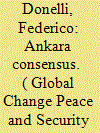

|
|
|
|
|
| Summary/Abstract |
Although research has examined the Turkish agenda for Africa since 2002, few studies have considered Turkey's uniqueness compared to other extra-regional actors. This study is an attempt to analyze and conceptualize the characteristics, benefits, challenges, and limits of Turkey's policy toward the region. This article argues that the characteristics of the Turkish agenda toward sub-Saharan Africa have made Turkey a non-traditional actor in the region, following a novel paradigm of sustainability development: the Ankara consensus. The effects of this model will continue to shape the decisions, policies, and perceptions of the Turkish political elite vis-à-vis Africa and, by extension, the Global South for the foreseeable future.
|
|
|
|
|
|
|
|
|
|
|
|
|
|
|
|
| 4 |
ID:
086139
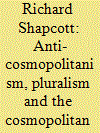

|
|
|
|
|
| Publication |
2008.
|
| Summary/Abstract |
For anti-cosmopolitan critics, cosmopolitanism is equated with the universalisation of a particular, liberal, account of justice and is therefore problematic for a number of reasons. The liberal principle 'do no harm' principle - and the cosmopolitan principle of humanitarianism, can be used to correct the depiction of cosmopolitanism as hostile to 'pluralism', to identify the universalism that is latent or undeveloped in much 'anti-cosmopolitanism', and to identify further means of reconciling these positions. A cosmopolitan harm principle argues that the absence of a universal conception of justice should not provide an obstacle to the recognition of an obligation to limit transboundary harms.
|
|
|
|
|
|
|
|
|
|
|
|
|
|
|
|
| 5 |
ID:
147641
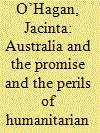

|
|
|
|
|
| Summary/Abstract |
Humanitarian diplomacy has always been a crucial element of humanitarianism, however it is now becoming a more prominent element of states’ foreign policies. It holds many attractions and much promise. It provides states with a way of expressing important qualities of international empathy and solidarity and can also enhance a state’s international reputation and provide valuable means for building relationship of trust and cooperation. This can in turn can be conducive to a state’s broader foreign policy objectives. However, there are also perils to the incorporation of humanitarian diplomacy into a state’s foreign policy. It can generate ambiguity and even conflict within a state’s diplomatic endeavours due to tensions between humanitarian and broader national interests. In exploring these issues it is useful to distinguish between humanitarian diplomacy and humanitarianism as diplomacy. This article explores these issues in relations to Australia’s diplomacy. It argues that Australia has actively engaged in humanitarian diplomacy and humanitarianism as diplomacy. Whilst the two are often complementary, there are areas in which they have been in tension and even at odds. This has implications for Australia’s international reputation but also for its capacity to undertake genuine and effective humanitarian action.
|
|
|
|
|
|
|
|
|
|
|
|
|
|
|
|
| 6 |
ID:
086958
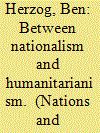

|
|
|
|
|
| Publication |
2009.
|
| Summary/Abstract |
The public and researchers alike view global/humanitarian and local/national logics as based on different, and even contradictory, regimes of justification. In this paper, however, I argue that these logics are complementary in the case of refugees. By asking 'who is a refugee?' within the Israeli case study, I empirically ground the claim that nationalism and humanitarianism should be grasped as Glocal. Content analysis of the Israeli case reveals how the Israeli establishment 'translates' the universal notion of humanitarianism. Humanitarian discourse does not offer an answer to the refugee problem by invoking a universal identity, nor is it just a euphemism for particularistic interests. On the contrary, the humanitarian logic is in fact based on the national order, and does not attempt to replace it. The political meaning of the term 'refugee' is an endless transcription of the national logic, and thus cannot be cosmopolitan.
|
|
|
|
|
|
|
|
|
|
|
|
|
|
|
|
| 7 |
ID:
157882
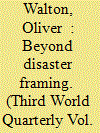

|
|
|
|
|
| Summary/Abstract |
This article examines how and why multi-mandate INGOs represent contemporary armed conflicts in particular ways. Based on empirical analysis of NGO communications and interviews with staff, it finds that these organisations typically adopt a two-track approach to representing conflicts. They use mainstream media to present consequence-oriented accounts to the general public, while utilising alternative channels to represent more nuanced depictions of conflict to more targeted audiences. These alternative forms of communication often aim to disrupt the dominant narratives of conflict produced by influential policy or media actors. Decisions about how to represent conflict are shaped by organisations’ histories, identities and funding relationships.
|
|
|
|
|
|
|
|
|
|
|
|
|
|
|
|
| 8 |
ID:
048958
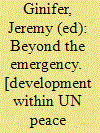

|
|
|
|
|
| Publication |
London, Frank Cass, 1997.
|
| Description |
x, 140p.
|
| Standard Number |
0714647608
|
|
|
|
|
|
|
|
|
|
|
|
Copies: C:1/I:0,R:0,Q:0
Circulation
| Accession# | Call# | Current Location | Status | Policy | Location |
| 039427 | 341.584/GIN 039427 | Main | On Shelf | General | |
|
|
|
|
| 9 |
ID:
167577


|
|
|
|
|
| Summary/Abstract |
Each year over the last decade, there were on average 400 humanitarian disasters or emergencies, killing more than 100,000 people and affecting a further 200 million. Such humanitarian events require immediate responses as well as effective longer-term activities to aid communities recover. The global response is now valued over US$27 billion annually. More than half a million people are estimated to work in this sector, the majority being locally engaged staff. The international community provides significant resources to assist local communities impacted by these humanitarian emergencies. This aid flows through multiple channels, including national and regional governments, international non-governmental organisations and local community based organisations. Increasing the skills and knowledge of leaders and managers of these responses is a critical need to ensure the most effective recovery in communities as well as use of resources. Understanding the professional journey in the humanitarian sector is vital, but currently limited. As the humanitarian sector continues to expand, greater focus on the skill-set needed by humanitarian workers responding to these events is needed. However, tensions exist between the primacy given to the experiences and soft-skills of humanitarian workers over the value of academic qualifications. This paper provides some suggestions how this tension within the humanitarian sector may be addressed and reconciled. This paper presents new data based on interviews with 20 humanitarian professionals from a range of humanitarian aid agencies and considers their experiences and reflections on building a career within the humanitarian sector.
|
|
|
|
|
|
|
|
|
|
|
|
|
|
|
|
| 10 |
ID:
072299
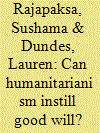

|
|
|
|
|
| Publication |
2006.
|
| Summary/Abstract |
One means of curbing anti-Americanism is to promote positive views of the United States and its people. The purpose of this study was to assess whether nearly a billion dollars pledged by the United States for tsunami aid instilled good will among Sri Lankans. Of 478 respondents, most considered both the American government (75%) and the American people (84%) to be generous. Half claimed that they liked the American people, a substantial increase over attitudes measured 2 years back, post-9/11. While fewer than half supported U.S. involvement in Iraq, the extent of this support increased significantly from post-9/11 levels, suggesting that humanitarian aid may result in broadened support for unrelated U.S. initiatives.
|
|
|
|
|
|
|
|
|
|
|
|
|
|
|
|
| 11 |
ID:
150582
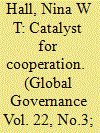

|
|
|
|
|
| Summary/Abstract |
Climate change is predicted to lead to an increasing frequency of natural disasters and humanitarian emergencies, yet scholars have not examined how the humanitarian community is responding to this issue. This article examines its initial engagement with the climate change regime and finds it was remarkably coordinated. Humanitarian agencies coauthored submissions to the UN Framework Convention on Climate Change, and the leaders of major humanitarian organizations spoke on co-organized panels on the humanitarian perils of climate change. In fact, the overarching trend was cooperation, not competition, among humanitarian agencies. This is an intriguing finding as it runs counter to the dominant account of a humanitarian marketplace in which actors are constantly competing for resources. Instead, this article suggests that the Inter-Agency Standing Committee played a significant role in mobilizing and coordinating humanitarian organizations' initial efforts. It highlights how and to what extent institutionalized cooperation between international organizations enables further cooperation in new issue areas and regimes. Scholars of international organizations, global environmental politics, and humanitarianism will be interested in how cooperation emerged in the humanitarian regime and shaped subsequent interaction with the climate change regime.
|
|
|
|
|
|
|
|
|
|
|
|
|
|
|
|
| 12 |
ID:
171349


|
|
|
|
|
| Summary/Abstract |
Celebrity humanitarianism has been transformed in its scope, scale, and organization in the last thirty years. Its flourishing has generated considerable academic interest from a wide variety of disciplines that share two characteristics. First, these studies are—unusually—well connected, which means that different disciplines have not tended to develop their own separate literatures, but learn from each other’s approaches. This makes it useful and important to identify ways different disciplinary approaches can complement each other. Second, most of this attention has focused on politics of celebrity humanitarianism in the global North. Yet focusing also on the South and on North/South relations will move the field forward. We argue that celebrity humanitarianism must be interpreted through the broader systems of which it is a part. We offer a heuristic typology of celebrity humanitarianism that continues to bridge between different disciplines and which identifies ways in which political science can complement existing studies. We also use this typology to refocus work on the politics of celebrity humanitarian relations away from merely Northern politics. This approach allows us to identify what sorts of politics and political solutions are being advocated by current forms of celebrity humanitarianism.
|
|
|
|
|
|
|
|
|
|
|
|
|
|
|
|
| 13 |
ID:
154211
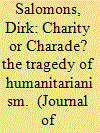

|
|
|
| 14 |
ID:
174655
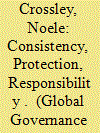

|
|
|
|
|
| Summary/Abstract |
Selective humanitarianism, it has been argued, may be condonable, or even preferable. Several arguments have been proffered in support of these views. This article revisits these arguments in light of the emergence of a discourse of protection and responsibility that now incorporates a wider spectrum of protection measures available to agents, of which armed intervention is but one. Consistency is an essential characteristic of ethics and the law—inconsistent practice diminishes the prospects of the development of norms of protection and associated practices and institutions. Furthermore, inconsistent practice means that fewer people receive protection from egregious violations of human rights. If the principles associated with human protection and humanitarianism are to become established norms of international society, international policy must be coherent, and international practice must be consistent.
|
|
|
|
|
|
|
|
|
|
|
|
|
|
|
|
| 15 |
ID:
118208


|
|
|
| 16 |
ID:
146653
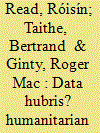

|
|
|
|
|
| Summary/Abstract |
This article looks at the promise of technology to revolutionise humanitarian action, especially in terms of the gathering and use of data. With many heralding a ‘data revolution’, the opportunities and enthusiasm for using social media and SMS data in crisis response are on the rise. The article constructs an analytical framework in order to scrutinise the three main claims made on behalf of technologically advanced humanitarian information systems: that they can access data more accurately, more quickly, and alter power relations in emancipatory ways. It does so in relation to two aspects of digital humanitarianism: visual technology and crisis mapping, and big data. The article is partly informed by a historical perspective, but also by interview and other material that suggests some of the claims made on behalf of technology are exaggerated. In particular, we argue that the enthusiasm for the data is vastly outstripped by the capacity to meaningfully analyse it. We conclude by scoping the implications of the future technological evolution of humanitarianism, in particular by examining how technology contributes to what Duffield terms ‘post-modern humanitarianism’.
|
|
|
|
|
|
|
|
|
|
|
|
|
|
|
|
| 17 |
ID:
109875
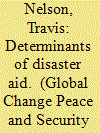

|
|
|
|
|
| Publication |
2012.
|
| Summary/Abstract |
This article examines the motivations behind the provision of disaster aid. Is this aid provision driven more by 'humanitarian' variables such as the severity of the political or natural emergency in the recipient state or 'political' variables such as the economic or strategic interest of the donor state? Through a statistical analysis of the aid activity of 22 donor states between 1997 and 2008, it is found that, contrary to much of the literature on humanitarian aid in general, humanitarian variables are consistently significant predictors of disaster aid provision. However, certain political variables are also significant, in that donor states provide more disaster aid to trading partners, former colonies, and military allies.
|
|
|
|
|
|
|
|
|
|
|
|
|
|
|
|
| 18 |
ID:
168481
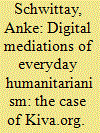

|
|
|
|
|
| Summary/Abstract |
The proliferation of Web 2.0 platforms that aim to facilitate social action, often connected to international development or environmental sustainability, has contributed to the ongoing popularisation of development. In this article, I argue that it has resulted in the digitally-enabled constitution of everyday humanitarians, who are everyday people supportive of poverty alleviation. Kiva.org, a US-based online microlending platform that invites everyday humanitarians to make US$25 loans to Kiva entrepreneurs around the world, is a prime site to study these processes. I show how Kiva cultivates supporters through the mediated production of affective investments, which are financial, social and emotional commitments to distant others. This happens through the design of an affective architecture which in turn generates financial and spatial mediations. While these result in microloans and attendant sentiments of affinity, they also lead to financial clicktivism and connections that obscures the asymmetries and riskscapes resulting from Kiva’s microlending work.
|
|
|
|
|
|
|
|
|
|
|
|
|
|
|
|
| 19 |
ID:
107197
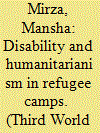

|
|
|
|
|
| Publication |
2011.
|
| Summary/Abstract |
There are an estimated 43.3 million forcibly displaced people around the world, many of whom live in refugee or internally displaced camps. These camps are disproportionately congregated in the developing world, making them a prevalent, yet often overlooked landscape in the global South. Among the scores of refugees living in refugee camps is a large number of people with disabilities. This article provides an overview of humanitarian practices and their guiding philosophies and how these address disability issues within the context of refugee camps. Examples of grassroots initiatives related to disability rights and disability inclusion within refugee camp settings are also provided. Using these examples, the paper makes the argument that refugee camps offer fertile grounds for the diffusion of a community-engaged, grassroots disability praxis across the humanitarian field and beyond.
|
|
|
|
|
|
|
|
|
|
|
|
|
|
|
|
| 20 |
ID:
156524
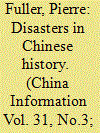

|
|
|
|
|
| Summary/Abstract |
Scholars in various disciplines have recognized that ‘natural’ disasters – and the extent to which natural hazards develop into humanitarian catastrophe – can reveal fundamental aspects of any particular government or society. What does history offer observers of disasters in contemporary China? What was the Chinese experience of environmental or natural disasters in pre-revolutionary or even premodern times? As recently as the early 2000s, the field of Chinese history offered little to answer such questions. Meanwhile, web searches remain the predominant avenue for non-academic researchers seeking historical contextualization, yet online searches on the vast majority of disasters in Chinese history continue to produce negligible results. With this in mind, a group of historians launched the website DisasterHistory.org in autumn 2015. Emerging now from its pilot stages, the site’s goals are to serve as an online introductory portal for academic studies and sources on Chinese disasters, to provide an accessible and reliable ‘go-to’ resource for academic researchers generally, and to create a forum for data-sharing and collaborative research for scholars across disciplines with shared interests in disasters, broadly defined.
|
|
|
|
|
|
|
|
|
|
|
|
|
|
|
|
|
|
|
|
|